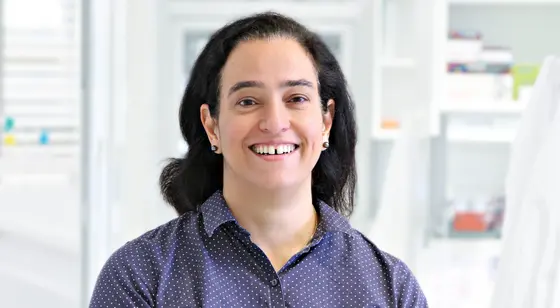What is special about the ERC's “Proof of Concept“ Grants is that this funding can only be applied for by those who already receive ERC grants. The Research Council thus wants to enable scientists to open up possible fields of application for their research results obtained in an ERC-funded project. “At the DKFZ, it is our declared goal to consistently check all scientific results for applicability and usability. This applies both to possible medical improvements that should benefit patients as quickly as possible and to the commercial exploitation, for example of improved research reagents,“ says Michael Baumann, Director of the DKFZ.
Nina Papavasiliou (ERC Consolidator Grant 2016) is investigating particular modifications in RNA molecules, the significance of which is still poorly understood: messenger RNAs (mRNA), the transcripts of genes, often contain modified building blocks. Scientists suspect that cells use these modifications as an additional control level to regulate the amount of protein whose blueprint is read from the respective gene. To better understand the actual role of these modifications in healthy and diseased cells, a simple but highly specific detection method is required. Previously available antibodies against the modified RNA building blocks often reacted unspecifically or were unable to bind sufficiently tightly to their target structure. Nina Papavasiliou has developed an immunisation system in her laboratory that is particularly suitable for generating high-quality and at the same time highly specific antibodies. With this system, the scientist plans to generate antibodies against the most common RNA modifications. Nina Papavasiliou is convinced that a suitable detection method will help to better understand the mysterious role of the modified RNA building blocks.
Mathias Heikenwälder (ERC Consolidator Grant 2016) also receives ERC PoC funding for the development of specific antibodies. The inflammation expert recently discovered that platelets migrating into the liver promote the development of a certain type of liver inflammation (NASH, non-alcoholic steatohepatitis), which in turn can degenerate into cancer. Drugs that are directed against the platelets can stop this process and thus prevent the development of liver cancer in mice, as Heikenwälder has already been able to show. Inflammatory fatty liver occurs less frequently in people who take these drugs. However, the drugs directed against blood platelets sometimes have serious side effects. Heikenwälder and colleagues have identified an enzyme on the surface of the platelets that is responsible for the development of the inflammation. The researchers' goal is now to generate therapeutic antibodies that specifically inhibit this enzyme. This could interrupt the dangerous cascade of inflammation and carcinogenesis without at the same time impairing the vital function of the blood platelets - blood clotting. In the long term, Heikenwälder and his colleagues hope to be able to contribute to the prevention of liver cancer with a suitable antibody.
Pictures of Nina Papavasiliou and Mathias Heikenwälder are available for download
Papavasiliou-Nina.jpg
Heikenwaelder-Mathias.jpg
Note on use of images related to press releases
Use is free of charge. The German Cancer Research Center (Deutsches Krebsforschungszentrum, DKFZ) permits one-time use in the context of reporting about the topic covered in the press release. Images have to be cited as follows: “Source: Jutta Jung / DKFZ“.
Distribution of images to third parties is not permitted unless prior consent has been obtained from DKFZ's Press Office (phone: ++49-(0)6221 42 2854, E-mail: presse@dkfz.de). Any commercial use is prohibited.



